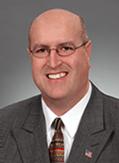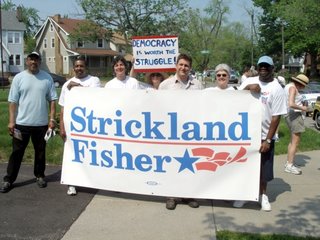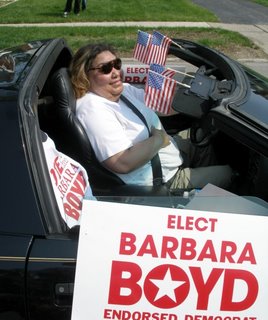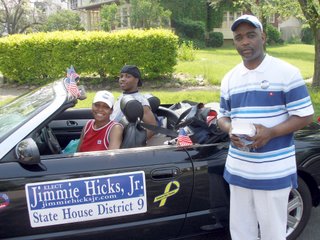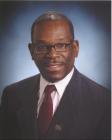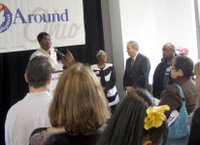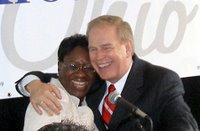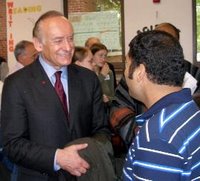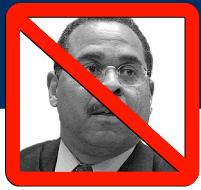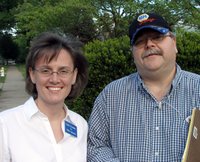
I'm a political blogger. I comment on elections from the outside. So I was startled when Ohio Senate 3rd District candidate
Emily Kreider (D-Westerville) sent me an email recently, inviting me to join her as she knocks on doors in her district, something she does five days per week. I had posted a
profile of Ohio Senate races with Republican incumbents, including the 3rd District, about which I wrote that "Kreider seems like an appealing candidate for this district. Her status as a small business owner, calling for strengthening communities and helping business, and her moderately pro-life position should help her. Her personal charisma may help make up for her lack of campaign experience." So I was intrigued and accepted the invitation.
Emily Kreider lives with her husband (and campaign treasurer) Tim and teen daughters Barbara and Rachel on a residential cul-de-sac tucked behind the retail businesses on a commercial street. Kreider's campaign headquarters are located in her dining room and den. On the dining room wall is a large map of the district, while heaps of notebooks and papers occupy the dining room table. The den is the center of computer and internet operations, including a customized data base for tracking voter contacts by Kreider and her host of over 200 volunteers. In addition to door-to-door canvassing, Kreider's grass-roots campaign includes weekly phone-banking.
We talked a bit about how she got into politics while waiting for her regional volunteer coordinator, Roger Moore, to arrive. Kreider worked as a volunteer in the 2004 presidential election, and afterward she and her co-workers decided that it was important to get Democrats elected locally. Laughing, she told me that when she first approached the Ohio Democratic Party about running for the Ohio House of Representatives, she really didn't know much about it. However, she points out, her supporters don't want a career politician, they want an average person to whom they can relate. The thing she hears most often from voters, she says, is that they're disgusted with politics. Too much corruption, too much scandal.
I asked about her switch from running for the Ohio House 19th District (where long-time political activist and grandmother of three
Marian Harris (D-Columbus) is now taking on incumbent Larry L. Flowers (R-Canal Winchester)) to seeking the Ohio Senate seat of incumbent David Goodman (R-New Albany). She replied that she jumped at the chance when Democratic Party leaders suggested it, because "I'll represent more people." The 3rd District cast 48.7% of its votes for John Kerry in 2004, so the potential support for a Democratic candidate exists. (Kreider added that 70% percent of the district's voters are officially listed as independents, although that number includes many who consider themselves Republicans.) Although she hasn't run for office before, she prides herself on her organizational skills (she has run a specialty toys store and a consulting business) and her one-on-one people skills (she has completed a postgraduate program for psychotherapists and worked on a child abuse and neglect prevention program for the Homeless Families Foundation and at a private psychotherapy practice). Plus, she has help from campaign aides who have worked on other campaigns, including at least one who has run campaigns for Republicans.
Trying to pinpoint her position on the ideological spectrum, I learned that this is a complicated question and not one she enjoys discussing, although she's happy to talk about particular issues. She considers herself pro-life and is the drafter of the
Ohio 95-10 Plan, a seven-point proposal for state legislation to reduce the number of abortions in Ohio by 95% in the next 10 years, comparable to a national plan sponsored by
Democrats for Life. On the other hand, she is endorsed by the
Stonewall Democrats of Central Ohio, she's a strong supporter of labor unions ("we need them more than ever"), and she supports raising the minimum wage (which she is quick to insist will not hurt small businesses). On her
campaign web site she emphasizes reducing reliance on property taxes for school funding, making health insurance more affordable for small business owners and their employees, and bringing manufacturing jobs back to Ohio.
Kreider says that the number one issue that 3rd District voters bring up is school funding. This focus is heightened by recent school levies that passed in Westerville and failed in Worthington. The number two issue is the economy, frequently expressed in terms of the high price of gasoline and the outsourcing of jobs. When I asked about the issue of abortion she said that voters don't often bring it up, but she is aware that there is an image of Democrats as being pro-abortion and "this matters, especially if people don't know much about either candidate."
With the arrival of Moore, a Navy veteran who sports a NASCAR hat and talks fondly of his days as a Reagan Republican (before George W. Bush soured him on the GOP), we set out a little after 5:30 pm to knock on doors. As we approached each house, Moore consulted the walk list on his clipboard and announced the political affiliations of the registered voters at that address. "Two 'U's and a 'D'," he might say, meaning that two residents are unaffiliated and one votes a Republican ballot in primary elections. We did not stop at all-'R' houses -- not a good use of campaign resources -- but houses with one D and one R seemed to be Kreider's special favorite. "I really like those," she said, "they're very interesting."
At the first several houses we got no answer. ("Too early," Kreider advised, "more people will be getting home around six or six-thirty.") Whenever that happened, the candidate carefully wrote out a note on a Post-It, signed it "Emily," and left it on her campaign flyer hanging on the door handle. I was impressed, even more so when she told me that she sends a hand-written follow-up postcard to every voter she actually meets.
The first person to answer was a tall, thin man with a mischievous smile under a big gray mustache. "Hi, I'm Emily Kreider and I'm the Democratic candidate for the Ohio Senate in our district," the candidate said, "May I leave some literature with you?" This was the point where I would have expected the man's smile to fade but it didn't happen. Kreider's manner is personable and disarming, her smile is very genuine, and at house after house people were happy to talk to her. In this case, the voter was a retired administrator for a school bus system. Kreider asked him about the effect of privatization on school bus operations and they spoke at some length, with the candidate mostly listening. When she happened to refer again to being a Democrat, he froze and jokingly made to hand back the flyer. (Apparently he didn't hear the word earlier.) "I've consistently voted Republican," he said, but added after a slight pause, "I didn't vote this last time [in the primary], though. Nope, it was just down there at the school, but I didn't go over there." Asked why, he spoke of his perception that legislation has come to be passed by a big consortium of interests who don't care about what people like him want. After a bit more discussion he announced, "Well, you're my neighbor, I'll vote for you. I'll talk to my wife, maybe she'll vote for you too." After a few pleasantries we turned to go and he said, "Unless your opponent comes and promises me pie in the sky, I'll vote for you." Then he revised his position. "Actually, if he promises me pie in the sky, then I'm definitely voting for you."
We spoke to about eight more people before I had to leave to drive back to Cleveland. There were two women sitting on their porch, registered Democrats, one of whom asked "Now, what party is Bush in again?" The other woman suggested addresses for finding more registered Democrats. There was a young man who accepted the flyer but said that he doesn't know how he will vote until he "figures it out by watching stuff on TV." (Moore gave him an "Emily" sticker for his pickup truck.) A young couple followed their dog out onto the front porch, where the man said they were "issue-driven" conservatives. "Particularly the right to life," he said, "I would never vote for a candidate who is for abortion." Kreider referred him to the part of her flyer that says she is pro-life. At that house Kreider casually asked the woman if she went to church nearby, and invited her to attend Kreider's church. (I asked later if she did this often and she blushed, saying that she does not, the question just came out naturally in that instance.) There was an elderly retired man who spoke of how he and his emphysema-stricken wife could barely pay their expenses due to rising property taxes. Kreider listened sympathetically and mentioned her idea for
revising the homestead exemption to reduce property taxes for senior adults and disabled people. Only one person shooed us away, saying that she had guests for dinner, although another looked so grim that Kreider merely offered him her flyer, thanked him, and left. "Do you think I did the right thing?" she asked me. I admitted that I thought she interpreted his body language correctly.
By the end of my visit I was convinced that Emily Kreider is, as she said, very good at one-to-one interactions. People responded positively to her. She is an excellent listener, a rare and under-rated quality, and my sense was that people relate to her as a concerned friend and neighbor rather than as a mere politician.
Before I left we spoke a bit more about the role of faith in politics. "Rod Parsley is in my district," she pointed out. (Rev. Rod Parsley of the World Harvest Church in Canal Winchester is a co-founder of the Ohio Restoration Project.) Kreider is up-front about her active membership in the Grace Evangelical Lutheran Church in Westerville, and believes it is a good thing for an elected official's religious faith to inform decision-making, but she says that she "doesn't feel it's necessary to bring it up on the doorstep." The real danger of mixing religion and politics, she added, is the diluting of faith. She recommended the book "God's Politics: Why the Right Gets It Wrong and the Left Doesn't Get It," by Jim Wallis, as something that influenced her thinking on the question.
As I drove away they were walking on to the next house.


